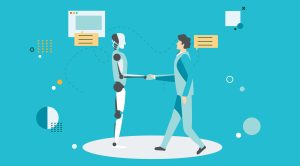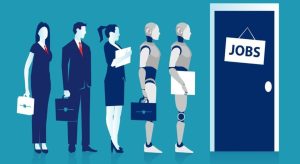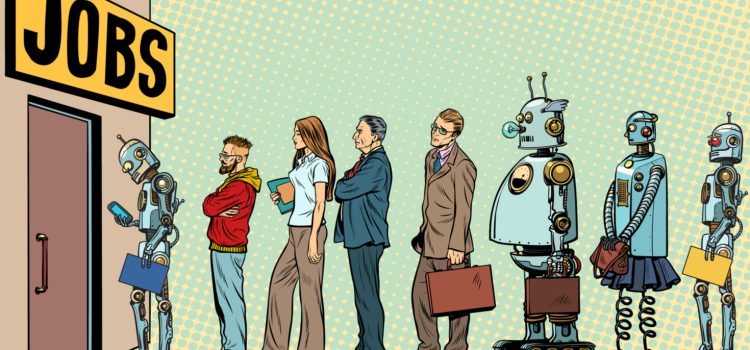
Artificial Intelligence (AI) has emerged as a transformative force in numerous sectors, influencing various aspects of life and work. This article delves into the impact of AI on job markets, exploring the benefits, challenges, and future outlook. We will also include an analysis table and a comparative table to provide a clearer understanding of the topic.
Introduction to AI and Job Markets

Artificial Intelligence, a branch of computer science focused on creating intelligent machines capable of performing tasks that typically require human intelligence, is rapidly changing the job landscape. From automation to enhanced decision-making, AI technologies are reshaping industries and redefining the nature of work.
Benefits of AI in Job Markets
AI systems can perform repetitive and mundane tasks at a much faster rate and with higher accuracy than humans. This increased efficiency can lead to significant productivity gains in various industries, from manufacturing to healthcare.
Creation of New Job Categories
While AI can automate certain tasks, it also creates new job categories. These include roles in AI development, maintenance, and oversight, as well as new industries emerging around AI technology, such as autonomous vehicles and smart home devices.
Enhanced Decision-Making
AI can analyze vast amounts of data to provide insights that assist in decision-making. This capability is particularly beneficial in fields such as finance, healthcare, and logistics, where data-driven decisions are crucial.
Challenges Posed by AI in Job Markets
One of the most significant concerns surrounding AI is the potential for job displacement. Automation can lead to unemployment in sectors heavily reliant on routine and repetitive tasks, such as manufacturing and administrative work.
Skill Gap and Training Needs
The rapid advancement of AI technologies requires a workforce with new skills. There is a growing demand for workers proficient in AI, data analysis, and other technological competencies. This shift necessitates substantial investment in education and training programs.
Ethical and Social Implications
The integration of AI in job markets also raises ethical and social questions. Issues such as data privacy, algorithmic bias, and the potential for AI to exacerbate social inequalities need to be addressed to ensure fair and equitable outcomes.
AI Impact on Specific Sectors
Manufacturing
AI-driven automation is revolutionizing manufacturing by increasing production speed and reducing errors. However, this shift also leads to job displacement for workers involved in routine manufacturing tasks.
Healthcare
In healthcare, AI enhances diagnostic accuracy and personalizes treatment plans. It supports healthcare professionals rather than replacing them, leading to improved patient outcomes and new job opportunities in AI health tech.
Finance
AI algorithms in finance enable better risk assessment and fraud detection. While some jobs, such as data entry and routine analysis, may be automated, there is a growing need for AI specialists to manage and interpret financial data.
The Future Outlook of AI and Employment
Evolving Job Roles
The nature of work is evolving, with a shift towards roles that require human creativity, emotional intelligence, and complex problem-solving. Jobs in AI oversight, ethical AI implementation, and AI-driven innovation are expected to grow.
Continuous Learning and Adaptation

As AI continues to evolve, the workforce must be prepared for continuous learning and adaptation. Lifelong learning and upskilling will be essential to keep pace with technological advancements and changing job requirements.
Policy and Regulation
Governments and policymakers must play a crucial role in managing the transition to an AI-driven job market. Policies that promote education, support displaced workers, and ensure ethical AI practices will be essential.
Analysis Table: Impact of AI on Different Job Sectors
| Sector | Positive Impacts | Negative Impacts | Future Outlook |
| Manufacturing | Increased efficiency, reduced errors | Job displacement in routine tasks | More focus on AI maintenance and oversight |
| Healthcare | Improved diagnostics, personalized care | Ethical concerns, data privacy issues | Growth in AI health tech jobs |
| Finance | Better risk assessment, fraud detection | Automation of routine tasks | Higher demand for AI and data specialists |
| Retail | Enhanced customer service, inventory management | Job losses in cashier roles | Rise in roles related to e-commerce and AI systems |
| Education | Personalized learning, administrative automation | Potential bias in AI educational tools | Increase in roles for educational AI development |
Comparative Table: Traditional Jobs vs. AI-Driven Jobs
| Aspect | Traditional Jobs | AI-Driven Jobs |
| Nature of Work | Routine, repetitive tasks | Complex problem-solving, creativity |
| Skills Required | Manual skills, basic education | Technical skills, AI proficiency |
| Job Stability | Higher in established roles | Dynamic, evolving with technology |
| Training and Education | Static, based on fixed curricula | Continuous learning, upskilling |
| Impact on Employment | Stable but potentially stagnant growth | High growth potential, new opportunities |
Conclusion
The impact of AI on job markets is multifaceted, with both significant opportunities and challenges. While AI can enhance efficiency and create new job categories, it also poses risks of job displacement and requires a workforce with new skills. The future of work will be characterized by continuous learning and adaptation, with a growing emphasis on roles that leverage human creativity and emotional intelligence. Policymakers, educators, and industry leaders must collaborate to ensure a smooth transition to an AI-driven job market, addressing ethical concerns and supporting displaced workers through education and training initiatives.










